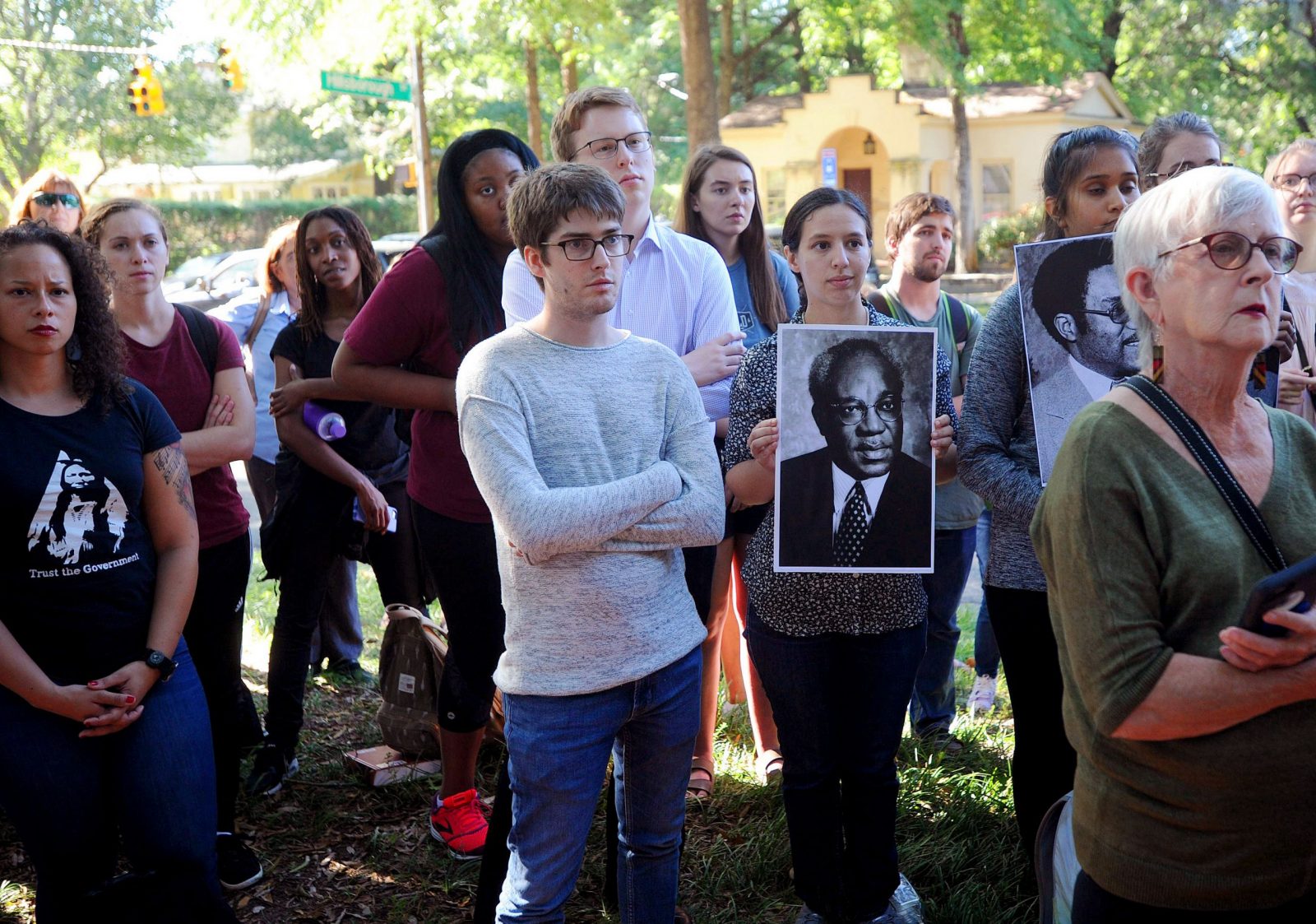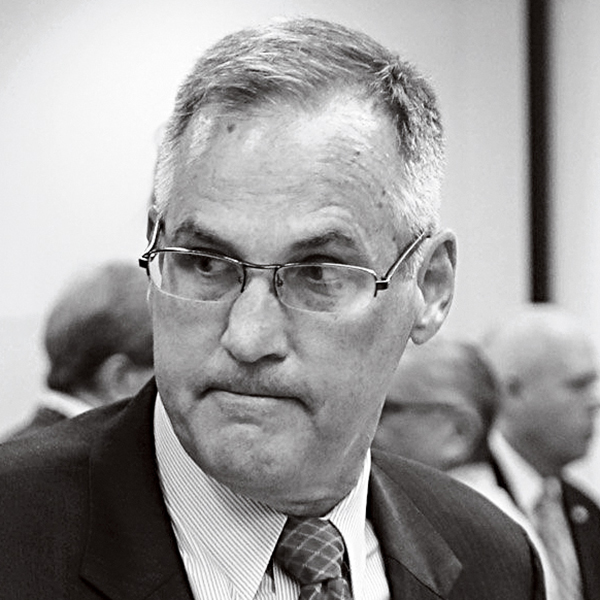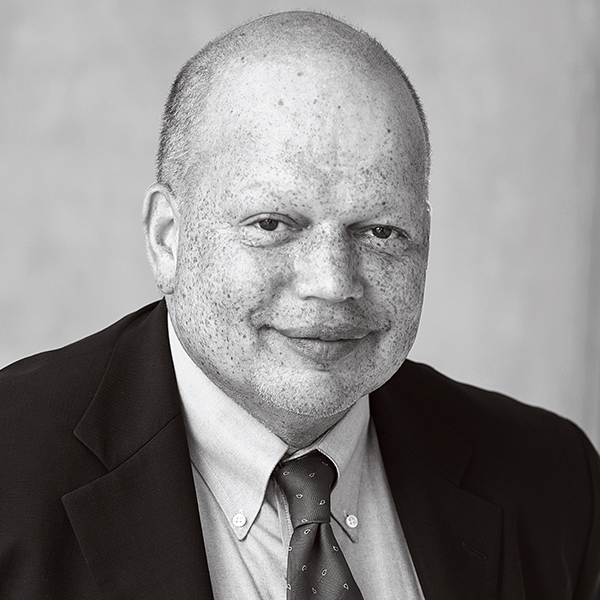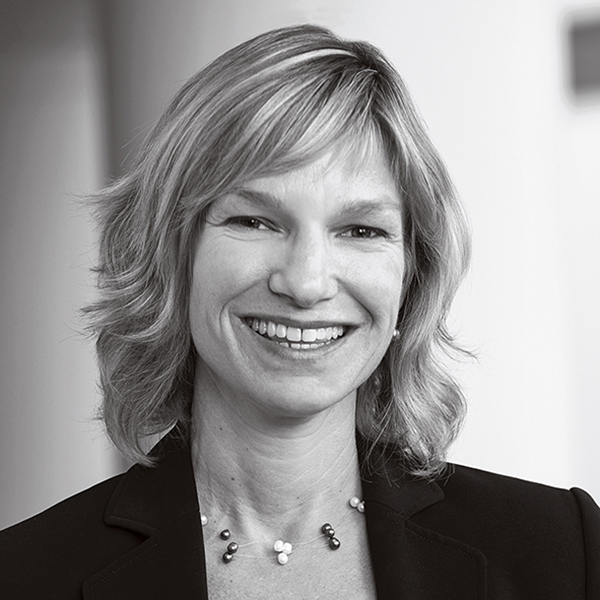Shutdown
Posted on Jan. 11, 2018
About 300 center supporters gathered on campus just before the BOG vote and marched to the home of UNC System President Margaret Spellings. (Herald-Sun photo by Bernard Thomas)
The law school’s Center for Civil Rights found value in teaching litigation by going after governments on behalf of people who lacked legal clout. The UNC System Board of Governors had a problem with that.
by Barry Yeoman
When Rex Young arrived at UNC’s School of Law, eager to work in the environmental arena, he signed up to volunteer for the school’s Center for Civil Rights. Within weeks, he found himself knocking on doors in an eastern North Carolina mobile home community, interviewing residents about the stench from hog waste that permeated their lives.
Few issues in North Carolina are more contentious than the impact of industrial hog farming on the people who live in its midst. Research from UNC’s School of Public Health has shown that the burden of the inescapable smell and scientific links to asthma, waterborne disease and depression falls hardest on African-Americans, Latinos and Native Americans.
That racial disparity drew the attention of the civil rights center, which in 2014 signed on as co-counsel for an administrative complaint against North Carolina’s state government. The document, filed with the U.S. Environmental Protection Agency on behalf of three grass-roots groups, charged that the state’s permitting decisions had violated the Civil Rights Act of 1964 and that minorities were suffering disproportionately as a result.
To convince the EPA to investigate, the center dispatched Young ’17 (JD) and some of his classmates to collect statements from neighbors. “We had several trainings,” he said, “teaching us how to properly interview folks, how not to speak in legal jargon — all the things you would need to do to be a successful advocate.” The students also learned professional standards for consent and confidentiality.
On a cloudy Saturday, they caravanned to Clinton, 90 miles southeast of Chapel Hill, where they fanned out and introduced themselves to neighbors.
The mobile home community was on the side of a highway, across from a cornfield. “People said, ‘If you can’t smell it already, I’d be happy to tell you what it’s like living down here,’ ” Young said. “Folks couldn’t stand to be outside for a family cookout. They couldn’t take walks in the woods or visit the family cemetery.” The hog waste, he learned, is carried on water droplets from the sprayers that disperse the waste onto open land. “When their kids wait at the bus stop, it gets on their clothes.” They would arrive at school smelling of pig feces.
Young now works for a renewable-energy company, and the hog farm matter remains unsettled. In January 2017, the EPA corroborated much of the original complaint in a 23-page letter to state regulators. “The … adverse impacts … are being felt by large segments of the communities of color, and are potential evidence of systemic concerns, not purely anecdotal claims,” wrote Lillian Dorka, director of the EPA’s External Civil Rights Compliance Office.
 “The fundamental issue is whether a university should hire full-time lawyers to sue third parties when student education is not the primary goal. Is the University’s mission limited? I think it is. We cannot be a public-interest law firm. That is not our role.”
“The fundamental issue is whether a university should hire full-time lawyers to sue third parties when student education is not the primary goal. Is the University’s mission limited? I think it is. We cannot be a public-interest law firm. That is not our role.”
— Steve Long ’82, BOG member
The center is now involved in settlement negotiations, and its longtime staff attorneys say they plan to follow the matter to its conclusion. But as long as it remains under the University’s umbrella, the center won’t be taking on new clients.
That’s because in September, the UNC System Board of Governors voted to strip the privately funded center of the ability to file complaints or lawsuits or to act “as legal counsel to any third party.” The ban (which technically applies to all University centers and institutes) followed three years of scrutiny by board members, who argued that litigation is expensive and strays from what should be the center’s academic focus. Just before Thanksgiving, managing attorney Mark Dorosin ’94 (JD) and senior staff attorney Elizabeth Haddix ’98 (JD) received termination notices effective on Nov. 30. (They plan to keep representing hog waste clients privately.)
“As a steward of the taxpayers’ money, it does not make any fiscal sense to me for us to expend any resources — it may be state resources or anything connected to the University — to file lawsuits against other government entities, thereby forcing taxpayer money to be spent to fight them,” said BOG member David Powers, a business lobbyist.
Staff and supporters of the center — which had paid for salaries, litigation and office expenses with private dollars from grants, foundations and individual donations — believe the board had another motive: to defang an institution that’s unabashed in its commitment to “dismantle structural racism.” Securing equality, they say, necessarily means confronting governments, first at negotiating tables and occasionally in courtrooms.
Theodore Shaw, the center’s director and a professor in the law school, does not mince words about the board’s decision.
“It clearly is a political hit,” he said. “Some of these folks, if they were around in the 1960s, they would have been opposed to the goals and the work of the civil rights movement. And if they were around in the 1860s, Lord knows what they would have supported and what they would have opposed.”
The Chambers legacy
Hovering over the debate is the ghost of Julius Chambers ’62 (LLBJD), the center’s founding director and one of the nation’s most revered civil rights lawyers. Chambers, who died in 2013, was part of the team that argued Swann v. Charlotte-Mecklenburg Board of Education, the 1971 U.S. Supreme Court case that empowered federal judges to order busing to desegregate schools. During the civil rights era, he endured two fire-bombings and an arson. He later became the first president of the NAACP Legal Defense and Educational Fund.
Chambers’ relationship with Carolina and the UNC System was fraught. He graduated at the top of his law school class but couldn’t attend its end-of-year banquet at a whites-only country club. He served on the Board of Governors in the 1970s but resigned over what he considered UNC’s sluggish approach to desegregation. Blacks, he said at the time, “could not get a fair shake at the University.”
It took 18 months for Gene Nichol, then dean of the law school, to persuade Chambers to lead the center in 2001. By then, Chambers was chancellor at N.C. Central University. “Do you have some kind of death wish?” Nichol recalled him saying. “They won’t let you open a center to represent poor black people. … And if we do our work, they’ll close us down.”
Chambers came aboard anyway and launched the center with a three-part mission: scholarship, student training and community-based advocacy.
 “It clearly is a political hit. Some of these folks, if they were around in the 1960s, they would have been opposed to the goals and the work of the civil rights movement. And if they were around in the 1860s, Lord knows what they would have supported and what they would have opposed.”
“It clearly is a political hit. Some of these folks, if they were around in the 1960s, they would have been opposed to the goals and the work of the civil rights movement. And if they were around in the 1860s, Lord knows what they would have supported and what they would have opposed.”
— Theodore Shaw, director of the Center for Civil Rights
The center considers the three parts interlocking. “The model that Chambers designed is that the research grows out of community advocacy,” Dorosin said. “It’s not sitting around thinking academically about legal problems that folks in eastern North Carolina might face. It comes out of meetings in communities where folks tell us what’s happening.” Likewise, students learn by immersing themselves in advocacy work.
For Alissa Ellis ’11 (’15 JD), volunteering for the center meant helping women who had been involuntarily sterilized — under a state-sanctioned eugenics program that lasted until 1974 — apply for compensation. It was essential training, she said: “I had done interviewing before. But I hadn’t really been educated on interviewing folks who experienced trauma.”
Besides eugenics victims, the center has worked with minority neighborhoods deprived of municipal services, such as garbage pickup and police protection; a century-old black settlement facing obliteration by a highway; and a coastal community laden with the least desirable neighbors, including a waste transfer station and a sewage treatment plant. It has tackled housing discrimination, affirmative action and voting rights.
One of the center’s core issues, and the subject of considerable conflict, is equal access to public education. Halifax County, near the Virginia border, has three separate school systems — carved out in the early 20th century explicitly to maintain segregation — for its 6,600 children. One district, Roanoke Rapids, is mostly white. The other two, Halifax County and Weldon, are overwhelmingly African-American. According to the center, the latter two have schools that suffer from mold, overflowing sewage and faulty heating and air-conditioning while Roanoke Rapids boasts a high school that “resembles a cathedral.” In test scores, Roanoke Rapids, not among the state’s highest, nonetheless outpaces the others.
“The kids are not getting a sound basic education,” said David Harvey, president of the county NAACP. “That has disproportionately affected the African-American student body.”
In 2011, Dorosin and Haddix produced a 65-page report chronicling the inequities, which community leaders used for education and organizing. Then in 2015, the center filed a lawsuit on behalf of five students, the NAACP chapter and a community association, asking county commissioners to consolidate the three systems into one.
The case has not gone as the plaintiffs might have hoped. It was first dismissed by the trial court. Then last September, the N.C. Court of Appeals upheld that dismissal by a 2-1 majority. The appellate majority acknowledged “serious problems in the schools” but added that the county government “does not bear the constitutional duty to provide a sound basic education.”
The center has appealed the case to the N.C. Supreme Court.
“There is no diversity”
It was another desegregation case that caught the eye of Steve Long ’82, the Board of Governors member who championed the advocacy ban. Long, a tax and benefits lawyer, says he read news articles about Pitt County, which he says paid $500,000 in attorney fees to defend itself against the center’s challenge to its school reassignment policy. “I said, ‘How is that even allowed?’ ” he recalled. (Pitt school officials could not verify the dollar figure, saying they paid a private law firm for various services and the current records aren’t itemized.)
As Long learned more about the center, he didn’t like what he saw. During a 2014 BOG working group meeting — called to review almost 30 centers and institutes throughout the UNC System — he addressed the center’s new director, Shaw.
“I’ve read your materials. There is no diversity of opinion at that center.”
“We’re civil rights advocates,” Shaw replied. (Like Chambers, Shaw headed the NAACP Legal Defense and Educational Fund.) “We have a point of view.”
The center survived that examination (unlike Carolina’s Center on Poverty, Work and Opportunity, which was shut down in 2015). But Long persisted in his critique.
“The fundamental issue is whether a university should hire full-time lawyers to sue third parties when student education is not the primary goal. Is the University’s mission limited? I think it is. We cannot be a public-interest law firm. That is not our role.”
Other critics directly attacked the center’s mission. George Leef, research director for the James G. Martin Center for Academic Renewal, a conservative think tank, described center staff as “leftist zealots.” But Long, a former board member of the conservative Civitas Institute, insists his concerns aren’t ideological. “I don’t care if they’re a conservative, liberal or moderate center. They should not be involved in litigation.”
 “As a steward of the taxpayers’ money, it does not make any fiscal sense to me for us to expend any resources — it may be state resources or anything connected to the University — to file lawsuits against other government entities, thereby forcing taxpayer money to be spent to fight them.”
“As a steward of the taxpayers’ money, it does not make any fiscal sense to me for us to expend any resources — it may be state resources or anything connected to the University — to file lawsuits against other government entities, thereby forcing taxpayer money to be spent to fight them.”
— David Powers, BOG member
The center and its defenders say critics either don’t understand or misrepresent the role of litigation. It is the tool of last resort, they say, an option that gives the center leverage during negotiations. “An advocacy organization that cannot litigate is, if not toothless, then certainly hobbled,” said Chris Brook ’02 (’05 JD), who interned for the center and now serves as legal director of the American Civil Liberties Union of North Carolina.
Former law school dean Judith Wegner says the center taught students that seeking justice requires many skills, including gathering evidence and talking with residents and public officials. Sometimes lawsuits are required; often they’re not. “It’s a powerful lesson for students who may have come to law school thinking it’s all about glamourous, swashbuckling [attorneys] in the courtroom,” she said.
Long and his allies say the proper way for students to gain litigation experience is through legal clinics, which combine classroom instruction with the chance to represent clients under direct supervision. The law school has seven such clinics, covering (among other things) immigration, consumer financial transactions, and domestic and sexual violence. Unlike the center, they are limited to third-year students. They, along with the law clinics at N.C. Central, are exempt from the new advocacy ban.
“It is very student-focused,” Long said of the clinic model. “But it also helps people outside the University.” He notes that other university centers that provide legal assistance — such as the University of Wisconsin’s Frank J. Remington Center, which assists inmates, and the University of Texas’ Capital Punishment Center — do so though clinics.
Shaw acknowledges the unusual structure UNC has had. He doesn’t see a problem. “One could have pointed to the center and the work that it does with pride and said, ‘We have something that is different and outstanding with respect to addressing a legacy of racial inequality, which exists in this country and North Carolina,’ ” he said. “That’s a strength.”
Haddix, for her part, calls the center-versus-clinic argument a false distinction. “This is not about form. It’s about substance. If we were a clinic doing a mission of the center, we would fully expect to have more retaliation from the Board of Governors.”
In other states, clinics have regularly faced political interference, ranging from “pointed inquiries [and] threats” to the “actual denial of clinic funding or prohibition on handling certain types of unpopular or controversial cases or clients,” wrote law professors Robert Kuehn of Washington University in St. Louis and Bridget McCormack of the University of Michigan in a 2011 article that documented 36 such efforts at public and private campuses.
Some of the most persistent attacks were directed at Tulane University’s environmental law clinic, which has taken on the petrochemical and other polluting industries. In 1993, Louisiana Gov. Edwin Edwards threatened to withhold funding for a basketball arena, restrict medical student access to state hospitals and deny financial assistance to Tulane students. Four years later, business leaders wrote to the state Supreme Court, which then tightened restrictions on the clients that clinics could represent.
The Tulane clinic’s work continued. So did the backlash. In 2010, the Louisiana Chemical Association urged its members to stop donating to Tulane and stop recruiting its students. “The university flies cover for a unit that considers it an honor to attack state agencies and kill jobs,” wrote the association’s president, Dan Borné. His group also pushed a bill that would have closed the Tulane clinic, but it failed.
Battles like this cause center supporters to depict the Board of Governors’ clinic exemption as meaningless. “The idea that clinics at these two law schools have some kind of safe harbor is chimerical,” Dorosin said. “When one of those clinics takes on a case that upsets some friend of a member of the Board of Governors — or somebody on the Board of Governors themselves — that clinic will be next on the chopping block.”
A quick vote
The lead-up to the Board of Governors’ vote was an emotional time in Chapel Hill. The campus protests against the Confederate monument known as Silent Sam had cracked open a larger conversation about white supremacy. Fifteen BOG members had just chastised UNC System President Margaret Spellings in an email for not taking a harder line against the “lawlessness” of anti-statue demonstrators.
The afternoon before the vote, about 300 center supporters gathered on campus. They marched first to Silent Sam and then to Spellings’ house, some carrying photos of Chambers. Among the speakers was Jenn Weaver ’04 (MA), a Hillsborough town commissioner who grew up in Charlotte after the Swann busing decision. “Julius Chambers touched my life and the lives of every public family of the busing era,” she told the crowd, “by helping us see [that desegregation] lifts up every student and is ultimately about accessing power.”
 “To not be part of a public university anymore is a real tragedy. That’s why the center was set up here: because of Julius’ legacy and the duty of public service that this University has.”
“To not be part of a public university anymore is a real tragedy. That’s why the center was set up here: because of Julius’ legacy and the duty of public service that this University has.”
— Elizabeth Haddix ’98, terminated attorney of the center
Weaver invoked the 1950s, “when some of North Carolina’s most prominent businessmen formed a group called the Patriots of North Carolina, with the express purpose of using their power and their connections to maintain segregation in our state’s schools. The Patriots found the violence of the Ku Klux Klan to be distasteful and wrong. But their fear of combining the races [was] the same.”
The Patriots, she said, “were the sort of men who would be appointed to the UNC Board of Governors.” If the next day, she added, board members were to restrict the Center for Civil Rights, “they will be eroding the tradition of Julius Chambers, of opening doors to power, and reviving the tradition of the Patriots of North Carolina, of closing them.”
The next day, at the board meeting, the debate over the new policy — which banned not only litigation but any type of client representation — lasted less than 25 minutes. Proponents of the ban talked about saving tax money. They emphasized the value of clinics. They denied political or racial motives. “It’s been a base canard that people would talk about this board’s not having a commitment to civil rights,” said member William A. Webb, an attorney who is African-American. “I would not serve on such a board.”
Then, by an overwhelming voice vote, the board approved the ban.
“Make sure this work can continue”
In November, the N.C. State Bar notified the law school that, in its opinion, the center was not authorized to provide legal services because it is neither a law firm nor a clinic. The bar issued its nonbinding “letter of caution” after receiving an anonymous complaint. “I’m perplexed,” Shaw said. “The State Bar has certified students to get credit for working at the center. I’m reminded of that scene from Casablanca: The State Bar is shocked, shocked to find out the Center for Civil Rights is practicing law.”
After the letter’s arrival, Dorosin said that “the University’s general counsel pushed us to expedite the transfer of the legal work.” The UNC center will stay open and focus on scholarly research and symposia. For legal advocacy, Dorosin and Haddix are exploring what a spinoff organization, unaffiliated with UNC, might look like.
“The ideal setting for that is a law school,” Dorosin said, “because that’s where you have the closest engagement with students, and also you can bring the resources of the broader university.” If that proves impossible, “it would be preferable to be connected to some existing social justice organization.”
For now, he and Haddix have created a nonprofit to continue their work, the Julius L. Chambers Center for Civil Rights, at least until they develop a long-term plan. “We’re in an incubation period for the next few months,” she said. “We’re keeping all options on the table.”
To Haddix, none of these options is perfect. The only other public law school in the state, N.C. Central’s, faces the same restrictions as Carolina’s. “To not be part of a public university anymore is a real tragedy. That’s why the center was set up here: because of Julius’ legacy and the duty of public service that this University has.”
Whatever the center’s future, Shaw says, he doesn’t want to dwell on the BOG vote. “Now it’s done and it’s history, and we have to make sure this work can continue elsewhere. I will go on, and I know the other members of the staff will go on, and find a way to do the work to which they’re committed. I’d be happy, at the end of the day, to let history judge who was on its right side and who wasn’t. But I’m trying to work to a point where I don’t think that much about them anymore.”
Barry Yeoman is a freelance writer based in Durham.
Thanks for reading the Carolina Alumni Review
Carolina Alumni members, sign in to continue reading.
Not yet a member? Become one today.
